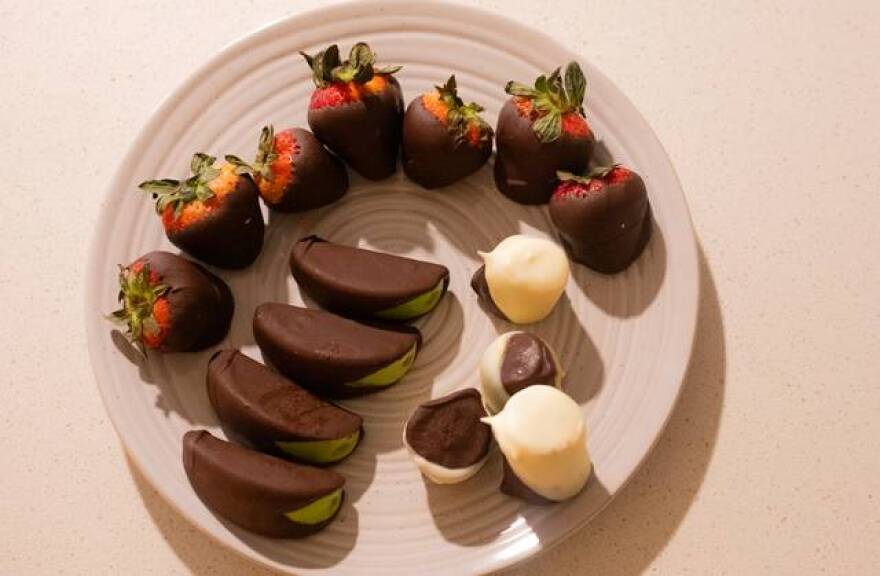Between all the restaurants, bakeries, hotels, cafes and assorted other eateries, a massive amount of food is made and sold every day in South Florida. But a staggering amount, an estimated third, goes unpurchased and winds up in the garbage.
That’s bad for the businesses but also bad for the climate. The food supply chain produces tons of greenhouse gasses and sending food to rot in landfills generates methane, another damaging emission.
Now, there’s an innovative way to reduce food waste — a new app called Too Good To Go that gives customers a chance to buy bags of perfectly edible food at cut-rate prices. There are some unusual wrinkles, starting with this: You won’t know what you’re getting until you open the to-go bag, its contents a hopefully appetizing mystery.
READ MORE: Here’s why Floridians, more than other Americans, believe climate change is real
Based on a trial run by The Herald, some Miami outlets on the app also can be surprising — pizza joints you might expect but also at least one strip joint. But who wouldn’t line up for dishes from the Booby Trap buffet? Yum.
“Food waste is unpredictable,” said Sarah Soteroff, a rep for the Denmark-based company that developed a concept that has become popular in Europe and now operates in 22 states. “You know what the store sells so it’s not completely out of left field but it is a fun thing to see.”
The app opened shop in Miami-Dade early this year and there are currently about 180 outlets signed up, many of them bakeries, but fewer so far in Broward. The goal is to add more restaurants and communities, Soteroff said, with Too Good to Go expanding this month to Orlando and Tampa. There are also food trucks, grocery stores and— at least when we used it — an exotic dance club offering bags of mystery meals. Soteroff said the company has saved about 68,000 meals so far in Miami-Dade.
To give it a try, the Miami Herald aimed for three meals a day from different spots over two days, which proved a bit impractical because many offerings come with tight windows for pick-up as the places close.
But four out of six bags proved hits. Some highlights: gourmet pizza slices, chocolate-covered strawberries and bananas, flaky croissants and pastries. Check our video to reveal the contents of each bag. All of them came at a third or less of what the places would normally charge. And most proprietors also were enthusiastic, happy to see a bag buyer.
“We are so glad we finally found a company where we can give food away and make someone happy for less money and make a little profit instead of wasting it and seeing food go to the garbage,” said Ricci Andretti, the hotel manager at CitizenM in the Miami World Center.

The app allows users to filter by dietary restrictions, times, locations and favorite restaurants. You pay in advance, betting the bag will be a bargain meal. Perhaps the biggest challenge is scheduling pick-up times. Each restaurant gets to choose when and how long that will be and they don’t necessarily offer something every day. Most of the food we sampled proved restaurant take-out quality. A mango in one bag had a small soft spot but was otherwise fine.
For some business owners, like Claudio Alicandri owner and chef at Casa Roma, Too Good to Go is also good marketing — a way to get customers in the door who he hopes will return and pay full price. He offers 10 pick up bags a day, and said most of his customers stop by around 6 p.m. after work. Soteroff said on average 72% of customers who try a restaurant for the first time with the app return to the store.
There were, naturally, a few bumps and surprises. At one place, the staff closing up wasn’t thrilled to stay open to fetch a to-go bag. And while you can often guess what kind of cuisine you’re getting — Casa Roma’s going to be something Italian, for example — some places might be more mysterious than others. For instance, The Herald visited “Trap Kitchen on the River” early one morning. On the app, the place billed “delicious soul food” that featured a photo of a buffet with rice and chicken.
Trap Kitchen turned out to be the Bobby Trap, a well-known strip club where the billboard flashes images of women in lingerie bathed in magenta and eclectic blue lasers. Outside, a few patrons squinted in the brightening sun and a guy who appeared to be a bouncer smoked that smelled funny outside the front door. Inside, an nice staffer chuckled when asked about the to-go bag. He said he wasn’t sure why the club was still on the app because multiple people had already been turned away that week.
So we never got to sample the the Booby Trap buffet offerings but Too Good to Go does let users report problems like no-go meals and quickly issued a refund. Maybe next time.

Ashley Miznazi is a climate change reporter for the Miami Herald funded by the Lynn and Louis Wolfson II Family Foundation in partnership with Journalism Funding Partners.
This story was produced in partnership with the Florida Climate Reporting Network, a multi-newsroom initiative founded by the Miami Herald, the South Florida Sun Sentinel, The Palm Beach Post, the Orlando Sentinel, WLRN Public Media and the Tampa Bay Times.
Copyright 2023 WLRN 91.3 FM. To see more, visit WLRN 91.3 FM. 9(MDAyNDY5ODMwMDEyMjg3NjMzMTE1ZjE2MA001))



